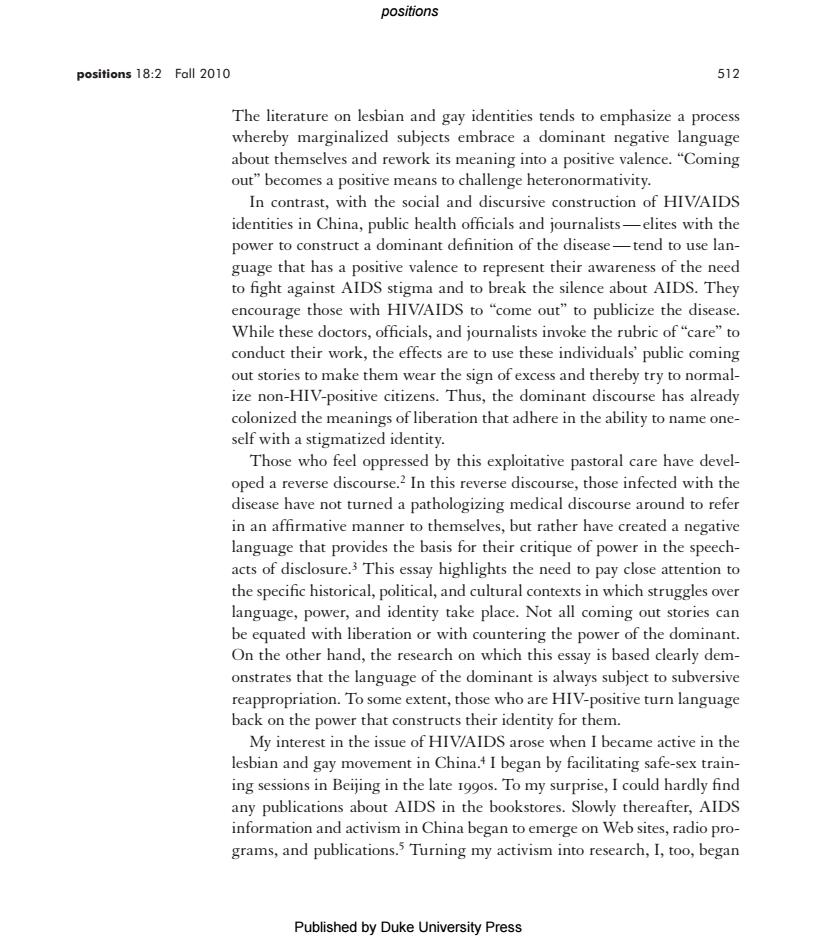正在加载图片...

positions positions 18:2 Fall 2010 512 The literature on lesbian and gay identities tends to emphasize a process whereby marginalized subjects embrace a dominant negative language about themselves and rework its meaning into a positive valence."Coming out"becomes a positive means to challenge heteronormativity. In contrast,with the social and discursive construction of HIV/AIDS identities in China,public health officials and journalists-elites with the power to construct a dominant definition of the disease-tend to use lan- guage that has a positive valence to represent their awareness of the need to fight against AIDS stigma and to break the silence about AIDS.They encourage those with HIV/AIDS to"come out"to publicize the disease. While these doctors,officials,and journalists invoke the rubric of"care"to conduct their work,the effects are to use these individuals'public coming out stories to make them wear the sign of excess and thereby try to normal- ize non-HIV-positive citizens.Thus,the dominant discourse has already colonized the meanings of liberation that adhere in the ability to name one- self with a stigmatized identity. Those who feel oppressed by this exploitative pastoral care have devel- oped a reverse discourse.2 In this reverse discourse,those infected with the disease have not turned a pathologizing medical discourse around to refer in an affirmative manner to themselves,but rather have created a negative language that provides the basis for their critique of power in the speech- acts of disclosure.3 This essay highlights the need to pay close attention to the specific historical,political,and cultural contexts in which struggles over language,power,and identity take place.Not all coming out stories can be equated with liberation or with countering the power of the dominant. On the other hand,the research on which this essay is based clearly dem- onstrates that the language of the dominant is always subject to subversive reappropriation.To some extent,those who are HIV-positive turn language back on the power that constructs their identity for them. My interest in the issue of HIV/AIDS arose when I became active in the lesbian and gay movement in China.I began by facilitating safe-sex train- ing sessions in Beijing in the late rggos.To my surprise,I could hardly find any publications about AIDS in the bookstores.Slowly thereafter,AIDS information and activism in China began to emerge on Web sites,radio pro- grams,and publications.Turning my activism into research,I,too,began Published by Duke University Presspositions 18:2 Fall 2010 512 The literature on lesbian and gay identities tends to emphasize a process whereby marginalized subjects embrace a dominant negative language about themselves and rework its meaning into a positive valence. “Coming out” becomes a positive means to challenge heteronormativity. In contrast, with the social and discursive construction of HIV/AIDS identities in China, public health officials and journalists— elites with the power to construct a dominant definition of the disease— tend to use language that has a positive valence to represent their awareness of the need to fight against AIDS stigma and to break the silence about AIDS. They encourage those with HIV/AIDS to “come out” to publicize the disease. While these doctors, officials, and journalists invoke the rubric of “care” to conduct their work, the effects are to use these individuals’ public coming out stories to make them wear the sign of excess and thereby try to normalize non-HIV-positive citizens. Thus, the dominant discourse has already colonized the meanings of liberation that adhere in the ability to name oneself with a stigmatized identity. Those who feel oppressed by this exploitative pastoral care have developed a reverse discourse.2 In this reverse discourse, those infected with the disease have not turned a pathologizing medical discourse around to refer in an affirmative manner to themselves, but rather have created a negative language that provides the basis for their critique of power in the speechacts of disclosure.3 This essay highlights the need to pay close attention to the specific historical, political, and cultural contexts in which struggles over language, power, and identity take place. Not all coming out stories can be equated with liberation or with countering the power of the dominant. On the other hand, the research on which this essay is based clearly demonstrates that the language of the dominant is always subject to subversive reappropriation. To some extent, those who are HIV-positive turn language back on the power that constructs their identity for them. My interest in the issue of HIV/AIDS arose when I became active in the lesbian and gay movement in China.4 I began by facilitating safe-sex training sessions in Beijing in the late 1990s. To my surprise, I could hardly find any publications about AIDS in the bookstores. Slowly thereafter, AIDS information and activism in China began to emerge on Web sites, radio programs, and publications.5 Turning my activism into research, I, too, began positions Published by Duke University Press